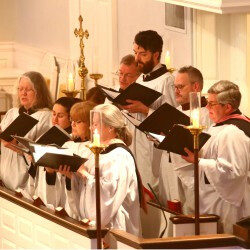 Maybe you’ve heard of Evensong before, but perhaps you don’t know what it is or why you should attend. At St. Peter’s, Evensong is for everyone, and you are warmly invited to attend this monthly service.
Maybe you’ve heard of Evensong before, but perhaps you don’t know what it is or why you should attend. At St. Peter’s, Evensong is for everyone, and you are warmly invited to attend this monthly service.
Please see the current listing of Evensong and other choral services.
When you take part in a service of Evensong, you are joining in a pattern of worship that has been developed in the Anglican church over many centuries. First-time attendees are often struck by the beauty of the service itself, the words that are said, and the music that it is sung.
Choral Evensong
Choral Evensong is a service of scripture, prayer, and music. It has been sung regularly in the Anglican church since the sixteenth century.
Evensong is typically sung by the St. Peter’s Singers, a sixteen-voice choir that has sung this service at St. Peter’s for over 25 years. On occasion, the Parish Choir, the St. Peter’s Choristers, or another ensemble may sing the service.
The word “Evensong” is a term first used in the 1549 Book of Common Prayer. It refers to the service of Evening Prayer. (Even a completely spoken service of Evening Prayer might be called “Evensong.”)
We refer to our service as Choral Evensong because many parts are prepared by the Choir, while the People (the congregation) join in saying and singing other parts of the service.
The Anglican Service of Evening Prayer
Evening Prayer, a worship service devised by Thomas Cranmer for the 1549 Book of Common Prayer, brings together many elements of the older monastic offices of Vespers and Compline, particularly their respective canticles the Magnificat (Luke 1) and the Nunc dimittis (Luke 2).
At St. Peter’s, the framework for this service is drawn from Evening Prayer (Rite I) as found in the 1979 Book of Common Prayer, the red prayer book found in the pews of St. Peter’s.
The Order of the Service of Evensong at St. Peter’s
The Entrance
At 5:00 p.m. the Choir enters from the rear of the church, accompanied by music from the organ.
The Choir often begins the service with an Introit, a short piece of choral music.
The Officiant, the clergyperson leading the service, then says an Opening Sentence drawn from the Bible. In penitential seasons the Officiant then leads the People in the Confession of Sin.
Preces and Psalter
The Choir then proceeds with the Preces. This music is usually bound together with the composed setting of the Responses, heard later in the service. Since the 1662 Book of Common Prayer, composers have been writing music for these words. The Preces and Responses are, therefore, the two elements of the service of Choral Evensong at St. Peter’s that does not strictly conform to the 1979 Book of Common Prayer (hereafter abbreviated BCP).
The Choir then sings the Psalms appointed for the day. The Psalms have been called “the backbone of Evensong.” Usually, the Choir sings the Psalms appointed for the evening (for instance: the Psalms appointed for the Eighth Evening are 41, 42, and 43). This tradition comes from the monastic pattern of chanting a portion of the Psalter in the morning and the evening every day so that all 150 Psalms would be sung in the course of a month
The Psalms are sung to Anglican chant, a formula unique to the Anglican choral tradition (hence the name!). The tradition of Anglican chant is nearly as old as the service of Evensong itself.
At St. Peter’s 1979 BCP translation of the Psalms is used. This is a clear, modern translation of this book of the Bible familiar to most Episcopalians (this same translation is used at morning services at St. Peter’s). At the conclusion of the Psalms, the Choir sings the traditional language version of the Gloria Patri (found on BCP page 141), another way in which we bridge old and new traditions.
Glory be to the Father, and to the Son, *
and to the Holy Ghost:
As it was in the beginning, is now, and ever shall be, *
world without end. Amen.
The Lessons
Then follows the First Lesson, which is always taken from the Hebrew Bible (sometimes called the “Old Testament”). The readings for each service are drawn from the Daily Office Lectionary in the back of the BCP.
The People then stand and join the Choir in the singing of the Office Hymn.
The Choir then sings the Magnificat. The Magnificat is the Song of Mary from Luke 1:46-55.
Because composers have been writing music for the Magnificat and Nunc dimittis centuries, the possibilities of music for Evensong are vast. Since the 1500s, many composers have written settings of both of these canticles specifically for the service of Evensong.
We sing the traditional language of these canticles (“My soul doth magnify the Lord”) not to be at all pretentious, but rather because in doing so we partake in an unbroken musical tradition going back to the earliest days of this service. These are the words that have been set to music for the service of Evensong since the time of composers like Thomas Tallis (1505–1585) and William Byrd (c. 1540–1623).
Latin settings of these canticles composed for the older services of Vespers and Compline are also sometimes used.
A note on the posture of the congregation during the canticles: in many places, it is customary to stand for the Magnificat and Nunc dimittis, a sign that the People participate in this aspect of worship even if they aren’t singing the words. At St. Peter’s, the People are asked to sit while the Choir stands and sings. We do this because many people find standing for the duration of these two canticles (which are sometimes rather lengthy, depending on which setting is sung) to be distracting or difficult. If, however, you feel compelled to stand, you are invited to do so. In any case, we hope that you will feel that you are able to pray these words with the Choir. The active, prayerful participation in the music that is sung by the Choir is the essence of the Anglican choral tradition. Evensong is most decidedly not a concert.
After the Magnificat comes the Second Lesson, which is always taken from one of the four Gospels (Matthew, Mark, Luke, or John).
Then the Nunc dimittis is sung. The Nunc dimittis is the Song of Simeon from Luke 2:29-32.
After this, all stand and sing the Apostles’ Creed.
The Prayers
All of the music for the Prayers is sung by the Choir to the same composed setting that was heard earlier in the service for the Preces. The Prayers begin with the salutation “The Lord be with you.” Though it is the Choir who respond with the choral response “And with thy spirit,” it is our understanding that the music written for this part of the service is for the choir to sing aloud, but that all present pray these words together. It is for this reason that the congregation kneels at this point of the service. This kind of participation in the prayers is the essence of the choral tradition of worship.
The Prayers then proceed with the Lesser Litany (“Lord have mercy upon us,” the same words as the Kyrie often used at services of Holy Communion) and the Lord’s Prayer (“Our Father”). Some versions of the Responses include a choral setting of the Lord’s Prayer, while others expect the whole congregation to chant the prayer together.
Then come what are known as the Responses. The responses are a series of short phrases called Versicles (sung by the Officiant, or a Cantor from the Choir) and the Responses (sung by the Choir).
Finally, the prayers end with three Collects, short prayers that follow a particular form. The first Collect is particular to the day. In the seasons of Advent and Lent a “Seasonal Collect” follows. The final two collects are always the same: a Collect for Peace and a Collect for Aid Against Perils. The Choir responds with a choral Amen to each Collect. The final Amen is usually slightly more elaborate, bringing this section of the service to a close.
The People then sit and the Officiant greets the congregation. The Officiant usually makes mention of the reception downstairs in the undercroft after the service. This is another important part of the St. Peter’s Evensong tradition!
Then the Choir sings an Anthem. Evensong was the first Anglican service to mention a piece of music by this name. The anthems sung at Evensong vary widely, but often anthems written specifically for Evensong are sung (since they don’t make much sense in the morning).
The Officiant then begins the Closing Prayers. First comes a time of prayer led by the Officiant which speaks to the specific needs of our congregation, our city, our country, and the world. Then follow two fixed prayers, the General Thanksgiving, said by all, and A Prayer of St. Chrysostom, said by the Officiant alone.
The service ends with a final spoken Versicle and Response (“Let us bless the Lord.” “Thanks be to God.”) and The Grace.
The People stand and sing a Hymn.
After the Hymn, the choir returns to the rear of the church where they gather in the Narthex. From behind closed doors the sing the Orison, a short prayer.
The singing of our Orison is a unique and beloved St. Peter’s Evensong tradition.
God that madest earth and heaven,
Darkness and light!
Who the day for toil hast given,
For rest the night!
May thine angel guards defend us,
Slumber sweet thy mercy send us,
Holy dreams and hopes attend us,
This livelong night!
Words: Reginald Heber
These words are sung to the Welsh tune Ar Hyd y Nos (“All through the night”) as harmonized by English composer Ralph Vaughan Williams (1872–1958). These words are also sung at many funerals at St. Peter’s
From the organ, we hear a concluding Voluntary, which, like the service that precedes it, is offered to the glory of God.
– David Sinden, Organist & Director of Music
The Feast of St. Francis, 2017

